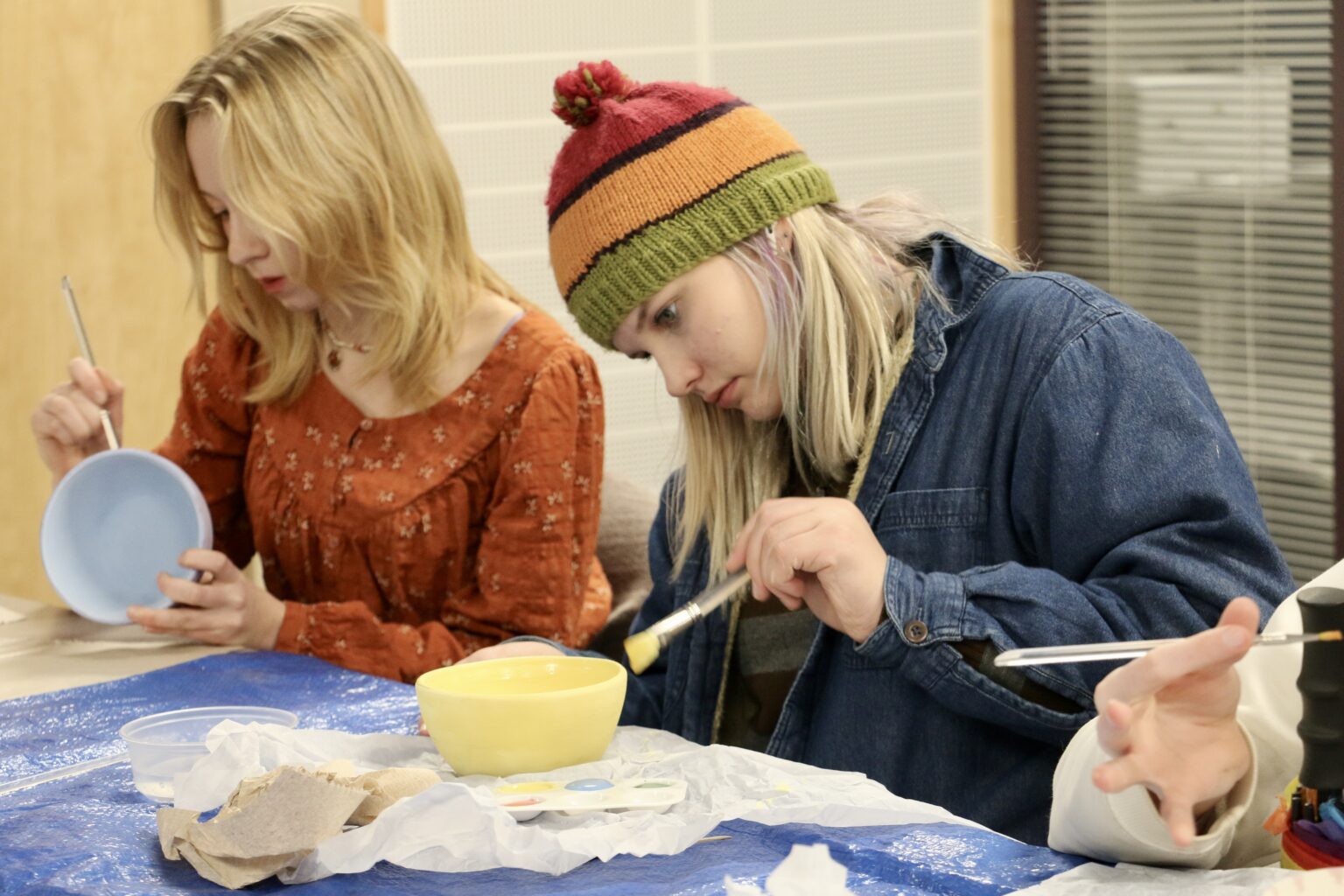Bellingham students are combating climate change the best way they know how: together, with painted ceramic bowls.
Each Monday, students from schools across the district meet after classes to tackle local climate-related problems and projects through the Youth for the Environment and People (YEP!) group.
“We are a youth group focused on reducing climate change in our community, and hopefully affecting the long-term,” said Ruby Thomas, a sophomore at Sehome High School. “It feels like an opportunity to actually do something about things going on.”
This year, students are focusing on a common project: reducing local food waste.
“Food waste is not just, ‘I didn’t eat everything on my plate,’” said Sawyer Hanson, a senior at Sehome. “It’s all the smaller crops that didn’t make it out of the grocery store, the ones that didn’t make it out of the field, the food we throw away from our plate, the scraps that aren’t used in restaurants. It’s each movement in the supply chain, from farm to plate, and everything lost in each of those different steps in the distribution process.”
More than a third of the food grown in the United States will never be eaten, and instead will end up in landfills, down the drain or left in fields to rot, according to ReFED, a national nonprofit fighting food waste. That’s about $408 billion worth of food, 4 trillion tons of water and massive swaths of land across the country, wasted.
As a result, food waste in the U.S. has a larger carbon footprint than the airline industry — a typical scapegoat of climate activists. And around the world, food waste accounts for almost 10% of greenhouse gas emissions.
“Food waste is one of the biggest contributors to climate change and greenhouse gasses,” said Scarlett King, a sophomore at Sehome. “The whole cycle of planting, harvesting, transporting — it has a lot more of an effect than people think it does, so we’re trying to raise awareness on that one thing, because one thing can start to make a difference.”
Throughout the semester, YEP! students meet and discuss climate issues, solutions and action projects they can complete to target problems. This year, the group has planned a day of events on Saturday, Dec. 3, at the Bellingham Farmers Market. Students will be present from 10 a.m. to 2 p.m. Saturday, where they’ll host information sessions, pass out pamphlets and lead activities related to local food waste and climate change.
Later in the month, YEP! students will sell hand-painted dishes, raising money for local food banks in Whatcom County.

YEP!, launched in 2017 by the local environmental nonprofit RE Sources, tackles issues on a local level, Squalicum High School junior Sebastian Dales said.
“I’ve been a part of YEP! for three years now,” he said. “Each year, we try to develop an idea for a project that helps our community. Last year, we organized tree plantings.”
The food waste-related projects are engaging to students because it’s something they witness every day, said Cambry Baker, the education specialist in the sustainable schools program at RE Sources.
“It’s not like asking a fourth grader to install solar panels because they don’t know how to do that,” she said. “Food waste has such a broad impact, and it’s pretty accessible to work on as a student.”
RE Sources has since partnered with the North Cascades Institute to offer a similar program in Skagit County Schools.
In addition to developing their own projects, the group discusses positive news and developments around Washington.
“We started offering YEP! as a different type of program where students could have their voices heard and actually be action-oriented and solutions-based,” Baker said. “That’s a big part of the program because there’s a lot of doom and gloom out there, so we only focus on solutions in here.”
Around the world, climate change anxieties are skyrocketing, particularly among school-age children, according to recent studies. Last year, thousands of 16- to 25-year-olds reported “eco-anxiety” has negatively impacted their daily lives.
YEP! students reported similar feelings.
“As kids, nobody listens to us,” Thomas said. “Nobody takes us seriously, and we really don’t have a voice in society.”
Dezeray Hammer, a senior at Options, said participating in YEP! activities helps her feel like she can make a difference.
“I feel like I’m finally able to do something and able to be a part of something instead of just watching on Instagram, or Youtube, or seeing it on the news,” she said. “I felt like, ‘Well, what can I do?’ I can’t help save the polar bears by going to Antarctica. Here, I finally feel like I have a way to help out and do my part and be a part of the change.”




